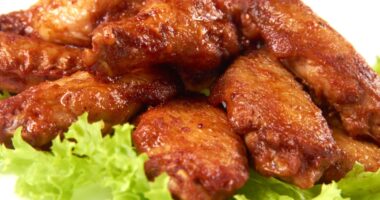Steakhouses are places of luxury and decadence; of dignified business meals and gilded anniversaries, lavish celebrations and buttoned-up soirees. Of course, they can also be more casual affairs with families and friends gathered around heaping platters of meat.
Whether consisting of dozens of locations or a mere few in major markets, steakhouse chains are as quintessential to American dining as apple pie, summertime hot dogs, and regional barbecue. But aside from varying menus and cuisine types, what sets one steakhouse apart from another is its quality of meat, as well as how they procure it, age it, and prepare it, which can make all the difference in taking one dining experience from good to great.
From a Brazilian staple to “vibe dining,” here are seven steakhouse chains with the best quality steaks in America.
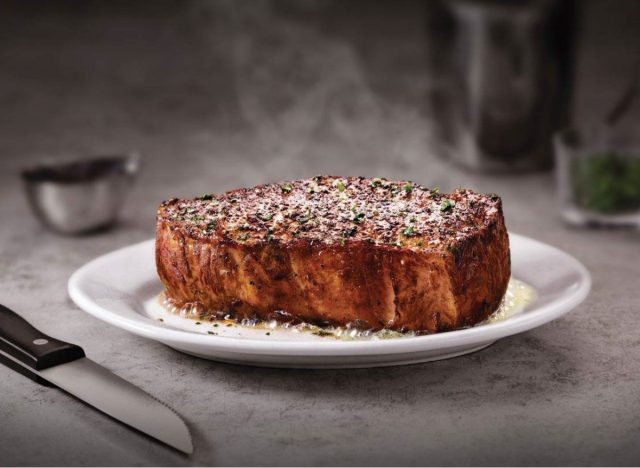

In the midst of a national comeback, one of America’s largest steakhouse chains owes at least part of its recent revival to the quality of its steaks. Ruth’s Chris champions the idea of simplicity, serving its meat on a sizzling 500-degree plate with nothing more than salt, pepper, and a sprinkle of parsley. It’s a philosophy that works well when the products are as top-notch as their USDA Prime cuts, rigorously sourced by reputable purveyors, and held to high standards.
“The steakhouse prides itself on its selection of only the finest cuts of USA Prime beef that are cooked to perfection via its beloved broiling method and served on a 500-degree sizzling plate to maintain that ‘last bite as good as the first’ philosophy,” says a spokesperson.
“Ruth’s Chris’ USDA Prime cuts are sourced by nationally recognized premium beef suppliers that are top-quality, well-marbled, and hand-selected grass- and corn-fed Midwestern beef.”
From filets and bone-in rib eyes to T-bones and porterhouses, meat comes from cows that start on grass-fed diets before switching to corn-fed, to achieve a specific flavor and quality, all while adhering to USDA’s guidelines for grading, quality, testing, and not to mention ethical sourcing. It’s a standard that founder Ruth Fertel would be proud of.
“The restaurant chain’s founder, Ruth, only picked the best cuts served with warm hospitality and good times, and they proudly continue to do the same,” says a spokesperson.
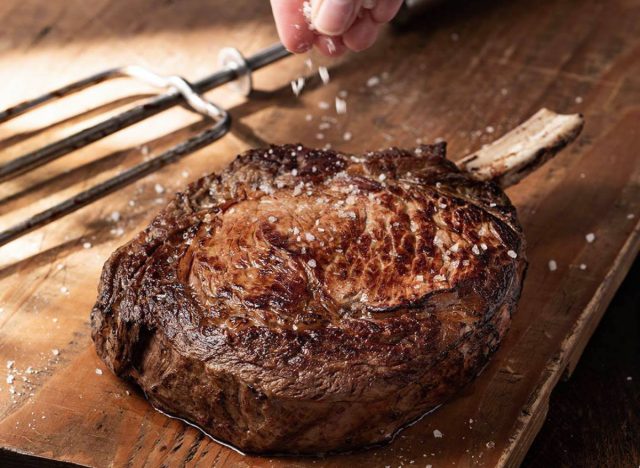

Fogo de Chao may be an American steakhouse, but it takes its Brazilian influences to heart. Namely, at the core of its meat-sourcing philosophy is the ethos of “Respeito Pela Comida,” a Portuguese phrase that speaks to the Brazilian gaucho way of nurturing, harvesting, and sourcing food with respect—for farmers, for animals, and for customers who appreciate quality meat.
For its roster of 21-day aged steaks, all sourced from the United States, the restaurant puts concerted efforts into partnering with vendors whose beliefs and ethics align with theirs. This includes the Five Freedoms of Animal Welfare, a guideline put in place by the Farm Animal Welfare Committee for sustainable sourcing and animal health, both mental and physical. It means that all the beef served at Fogo de Chao comes from cows that live happy, healthy lives in wide-open spaces, free of hunger, thirst, discomfort, pain, or distress.
When it comes to sourcing meat, the chain is so ardent about these tenets that they request all suppliers provide animal welfare statements, results of third-party audits for adherence, and sustainability certifications. In 2019, Fogo de Chao became the first steakhouse chain in America to use HerdX, an agri-tech company that tracks and traces the meat it sources.
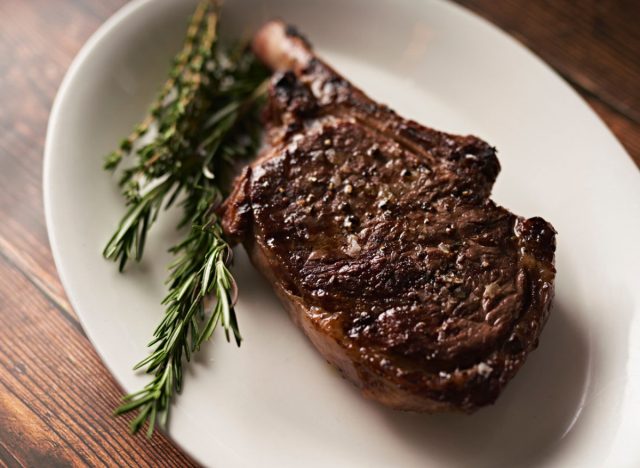

When a steak is so good you put your name on it and trademark it, you know it’s gotta be something special. That’s the case at Shula’s Steakhouse, the Florida-bred chain founded by NFL coach Don Shula. His bar for good steak was so high that he established a new set of nationwide standards for his restaurants with the SHULA CUT®. It’s an exclusive, all-premium Black Angus steak sourced from Graham Angus Farms in Georgia, and then aged, cut, and trimmed to rigorous parameters.
Very few steaks in the U.S. meet the standards for becoming a SHULA CUT (fewer than 1%, according to the steakhouse), hence the exacting sourcing strategy. In fact, Shula’s is so adamant about sourcing top-quality meat that members of the steakhouse management team help oversee farm operations, showing that they not only talk the talk but also walk the walk.
In order to meet their menu needs, going above and beyond standards set forth by the USDA for prime beef, steaks must meet multiple science-based specs to ensure the optimal consistency, flavor, marbling, maturity, tenderness, leanness, and appearance. Whether savoring a 24-ounce porterhouse, a 16-ounce strip, or a buttery filet mignon, any discerning steak-lover can tell the difference.
READ RELATED: This is the #1 Fastest Way to Reduce Your High Blood Sugar
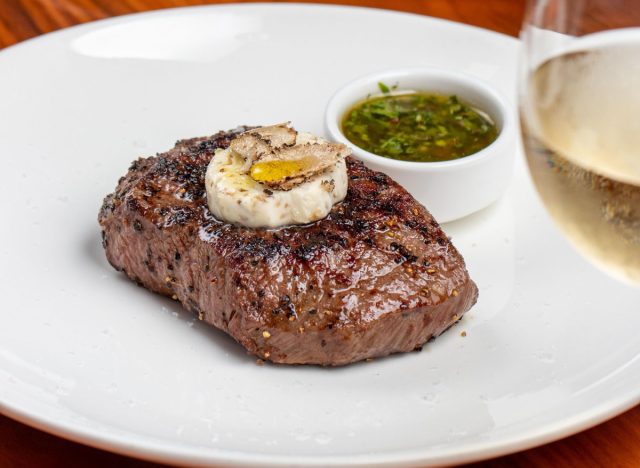

Any steakhouse transparent enough to sell fresh cuts of prime beef direct to customers is clearly proud of its product. STK, the increasingly popular chain known for its sexy decor and self-described “Vibe Dining,” became the latest steakhouse to start shipping steaks direct to customers as part of its new STK Meat Market in late 2021.
Not only does it provide opportunities for a much larger consumer base (i.e. customers who don’t live in one of the 13 U.S. cities where the restaurants are located), but it shows that they’ve got nothing to hide and that their meat quality speaks for itself.
The chain sources beef exclusively from the Midwest, either Angus USDA Choice or USDA Prime, the former finished on a corn-fed diet that lends added marbling, richness, and tenderness. All steaks, aside from a few dry-aged options, are wet-aged for at least 30 days.
Whether you’re cooking your own STK steak at home, or dining on an 8-ounce flat iron or 16-ounce cowgirl rib eye (perhaps even gilded with lobster butter) at one of their locations, the quality and care that goes into the meat, every step of the way, is palpable.
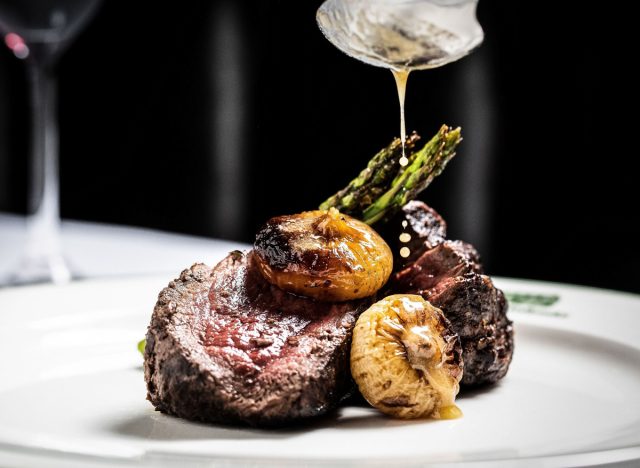

Like Shula’s, Smith & Wollensky is another steakhouse chain that goes the extra mile to not only uphold rigorous standards for sourcing but to actually partner with cattle farms. Most recently, the chain announced a partnership with family-run Double R Ranch in Washington, taking its sustainability and consistency standards to the next level through a single-source purveyor for its premium meats.
With its wide-open spaces (a whopping 70,000 acres, to be exact) and mild climate (which fosters renewable food for cattle, like alfalfa, hay, and potato, plus vitamins and minerals from a professional cattle nutritionist), the Pacific Northwest farm is an ideal source for cattle that’s raised with care and compassion.
“I believe Double R Ranch is the finest premium beef available on the market, hand-selected to include only the highest levels of marbling on the USDA grading scale,” said Smith & Wollensky’s corporate executive chef Matthew King. “We have furthered our commitment to the tradition of ranching with like-minded collaborators and support of sustainable farming practices. At Double R Ranch, sustainability, total quality, animal well-being, and social responsibility are a way of life, and we are excited to share their story, seasoned to perfection, through our food at Smith & Wollensky.”
The chain features Double R Ranch USDA prime steaks and signature filets, which are aged in-house for an additional 28 days to achieve optimal flavor and texture.
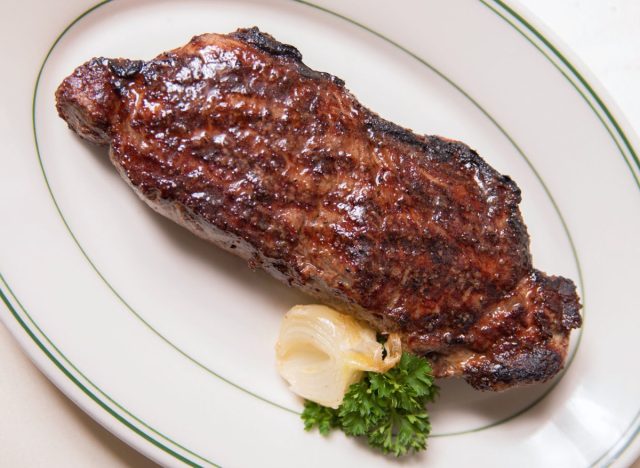

Seafood may take top billing at Joe’s Seafood, Prime Steak & Stone Crab, but don’t sleep on the meat at this surf & turf mecca. With locations in Chicago, Las Vegas, and Washington, D.C., this ritzy mini-chain trades exclusively in top-quality ingredients, be it from sea or land.
“It is paramount to, first and foremost, build strong relationships with our purveyors,” explains chef-partner Justin Diglia of the restaurants’ core tenets. “They are the ones we rely on when it comes to consistently sourcing the highest quality beef and butchering it to our specifications. When the meat arrives at the restaurant, we have a highly trained receiver that weighs and inspects every steak to ensure it’s up to Joe’s standards. And then finally, our kitchen team taste-tests steaks weekly to ensure the flavor profiles are up to par.”
All the beef hails from the Midwest, where climate actually makes for a mean piece of meat. “Our harsh winters and abundance of natural resources produce some of the best beef in the world,” adds the chef. “All of our beef is corn-finished giving depth of flavor and a nutty finish.”
Menu options run the gamut from dry-aged chopped steak and a 16-ounce New York strip to bone-in rib eye and a surf & turf of filet mignon with king crab, asparagus, and Bearnaise sauce.
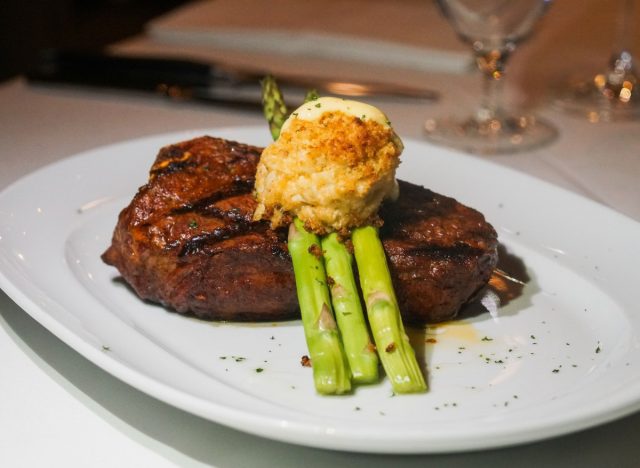

With locations in Houston, Chicago, Philadelphia, and Charlotte, Steak 48 is one burgeoning steakhouse chain that’s small but mighty, with a reputation built on quality. Owned by the same folks who founded legendary Mastro’s Steakhouse, each Steak 48 location boasts an in-house butcher shop, with trained butchers who custom-cut 28-day wet-aged steaks, from bone-in Kansas City strips to grass-fed New York strips. Once ready, they hit the 1,800-degree broiler and get plated with the likes of sautéed blue cheese, crab cakes, and foie gras.
Before it gets gussied up, though, it starts at the source: most of the meat for the restaurants comes from farms in Michigan and Wisconsin, along with extra-special premium Wagyu from Mishima Reserve, a Washington company that raises a herd of Japanese-heritage Kuroge Washu bulls bred with American cows.
A previous version of this article was originally published on April 22, 2022.
Source:






